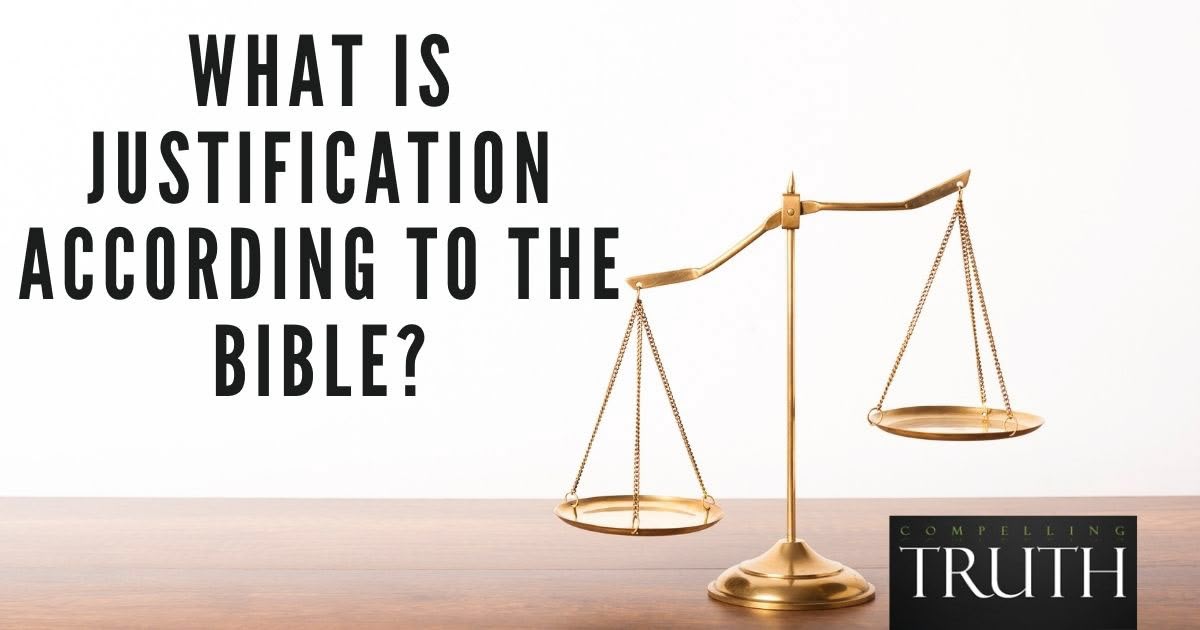When we are justified, the perfect righteousness of Jesus is credited to us so that God the Father only sees the perfection of God the Son when He looks at us. But being sanctified means that we are being made perfect in a practical sense; we are not yet perfect, but through the work of the Holy Spirit in us, we are being made more like Jesus Christ on a daily basis. Both justification and sanctification have a theological basis and a practical application.
Theological Justification
Theologically, justification is a sinful person being declared righteous before a perfect, holy, and righteous God (Matthew 5:48). It is all about our standing before God and being declared either guilty or not guilty. The only way we can be declared not guilty is through the work of Jesus Christ on the cross and the free gift of salvation that comes from believing in Him. The Bible says, "All have sinned and fall short of the glory of God" (Romans 3:23). In other words, there is no one on earth who has not sinned, and therefore, no one who meets the righteous requirements of God (see also Romans 5:2–14). Since we are all sinful people and the result of sin is death and eternal separation from God (Genesis 2:16–17; Romans 6:23), then we are all subject to death and eternal separation from God (John 3:16–18, 36). It is not possible for mankind to reconcile himself to God; that is, humans cannot put themselves into right standing before God by anything they do because sin has already tainted everything we do (Isaiah 64:6).
It was because of the depth of mankind's sin that God destroyed the world with a global flood (Genesis 6—9), and it was because of mankind's continued sin that God brought forth what we know as the Mosaic law (Galatians 3:19). And though that Law shows us what is necessary for righteousness, we are still incapable of accomplishing it because the depth of our sin is so great. Paul wrote, "Yet we know that a person is not justified by works of the law… because by works of the law no one will be justified" (Galatians 2:16).
This is where grace comes in. Because God loves us, He sent Jesus Christ into the world for the purpose of meeting the righteous requirement of the Law on our behalf (John 3:16). Jesus' death on the cross was a substitutionary atonement for the death we deserve. His resurrection proved that His sacrifice was sufficient, that He is who He claimed (fully God and fully human), and that He is victorious over sin and death. It is because of God's grace that we are saved and not because of anything that we do (Ephesians 2:1–10). For those of us who believe in Jesus Christ, "There is therefore now no condemnation" (Romans 8:1). In other words, we who have put our faith in Jesus Christ are justified in the eyes of God and are no longer condemned because of our sin; we are made right before Him despite our sinfulness because of the work of Jesus Christ on the cross (2 Corinthians 5:17–21).
Practical Justification
In a practical sense, justification is like being declared guilty and the punishment being passed on to someone else. Think of it in this sense: Imagine you are guilty of murdering someone. Everyone knows you are guilty; you admitted your guilt and now you are standing before a judge who confirms your guilt and passes out a sentence of death. Just before they take you to be executed, someone stands up and says, "I will take the punishment for them!" This person didn't commit the crime, but the judge allows them to be executed in your place and you are set free. This is exactly what Jesus has done for you! For, "at the right time Christ died for the ungodly" (Romans 5:6). We have been set free from sin (Romans 6:7, 18)—from its punishment and from its control over us. This is why the Bible says, "But now that you have been set free from sin and have become slaves of God, the fruit you get leads to sanctification and its end, eternal life" (Romans 6:22). So, justification leads to sanctification; without the former, you cannot have the latter.
Theological Sanctification
Sanctification is not the same as justification. Wayne Grudem, in his Systematic Theology outlines the core differences in the two terms and their application for our lives. He says that justification is a legal standing, once for all time, entirely God's work, perfect in this life, and the same in all Christians. Whereas sanctification is an internal condition, continuous throughout life, we cooperate, not perfect in this life, and greater in some Christians than in others (Wayne Grudem. Systematic Theology; an Introduction to Biblical Doctrine. Grand Rapids MI: InterVarsity Press, 1994, 746.).
Justification is what happens at the moment we are saved. Jesus said, "I am the door. If anyone enters by me, he will be saved" (John 10:9). In other words, it is only through Jesus Christ that we can pass from the condition of condemned to the condition of justified and then be sanctified. However, sanctification is a process that is ongoing in every Christian.
Once we are saved, our lives are transformed, the old passes away and the new person is born (2 Corinthians 5:17; 1 Peter 1:3, 23). Yet, as every Christian knows, we find that our old self continues to try to wrestle back control of our lives. The process of sanctification (and it is a process) is the manner in which the Holy Spirit transforms us to be like Jesus Christ. The Bible says we were chosen to be conformed to Christ's image (Romans 8:29). This means we were meant to be just like Jesus Christ, but the process (sanctification) is something which takes place over time.
Practical Sanctification
According to Grudem, there are three stages to the process of sanctification (Wayne Grudem. Systematic Theology; an Introduction to Biblical Doctrine. Grand Rapids MI: InterVarsity Press, 1994). First, there is a definitive change in moral behavior and belief when a person is justified before God. That is, at the moment we are truly saved, we have an immediate change in how we view God, life, sin, morality, and righteousness. Paul wrote that we must consider ourselves "dead to sin and alive to God in Christ Jesus" (Romans 6:11). This is the immediate change that takes place; we see sin for what it is. This does not mean, however, that we suddenly stop sinning. The Apostle John wrote, "If we say we have no sin, we deceive ourselves, and the truth is not in us" (1 John 1:8). King Solomon said, "Surely there is not a righteous man on earth who does good and never sins" (Ecclesiastes 7:20). This includes Christians; we are not suddenly perfect people, but the first step in sanctification is that we recognize this truth.
This helps us better understand the second stage of sanctification, namely, that it is a lifelong process. Because we live in a sinful world run by Satan, and because humans have a sinful nature, we are still tempted and deceived into sinful behavior (James 1:13–18; 1 John 2:15–17; 1 Peter 5:8–11). The New Testament is replete with instructions to put sin to death, precisely because sin is still a problem for believers (Colossians 3:5–17; Romans 6—8). Paul wrote, "We all… are being transformed into the same image from one degree of glory to another. For this comes from the Lord who is the Spirit" (2 Corinthians 3:18). Our sanctification comes gradually and in ever-deeper layers.
Understanding that the holiness of God is pure perfection, we see that we cannot attain that perfection on our own. Jesus said, "I am the vine; you are the branches. Whoever abides in me and I in him, he it is that bears much fruit, for apart from me you can do nothing" (John 15:5). In other words, by remaining close to Jesus, we continually seek the work of the Holy Spirit in our lives to make us more like Christ. Paul encouraged the Philippian church to "work out your own salvation with fear and trembling, for it is God who works in you, both to will and to work for his good pleasure" (Philippians 2:12–13). God ultimately does the work in our hearts, and we are called to cooperate in the process of sanctification. We do this through things like consistent study of God's Word, time spent in prayer, and time spent with other Christians. We seek to be "doers of the word, and not hearers only" (James 1:22), meaning we seek to obey God (John 15:1–17). We are incapable of making ourselves holy, but this doesn't mean we do nothing at all; we call this spiritual discipline.
Until our death, the work of the Holy Spirit within us will continue to sanctify us and make us more like Jesus Christ. This is seen in the behavior of every true Christian; that they are gradually more loving, joyful, peaceful, patient, kind, gentle, faithful, and more self-controlled; that they gradually are more like Christ (Galatians 5:22–23). The final stage of sanctification comes at our death. This is also referred to as glorification. When we pass on from this life we pass into eternal life (Matthew 19:29; John 3:15–16; Romans 2:7; 2 Corinthians 5:6; 1 Peter 1:3–9; 1 Corinthians 15:42–45, 50–58). We will be free from the presence of sin.
This process works at a different pace for everyone because everyone is different. But everyone who has put their faith in Jesus and thus has the indwelling Holy Spirit, regardless of pace, is being sanctified. Every one of us is called to cooperate with God in that process, putting our sin to death and putting on the "new self" in Christ (Ephesians 4:17–32; Romans 12:1–2). This is what Paul was talking about when he wrote, "I have fought the good fight, I have finished the race, I have kept the faith" (2 Timothy 4:7). We must all fight the good fight, run the race, and keep the faith for we are being sanctified by Him who loves us and gave Himself for us (Galatians 1:4; 2:20; Ephesians 5:2, 25; 1 Timothy 2:6; Titus 2:14).
Theological Justification
Theologically, justification is a sinful person being declared righteous before a perfect, holy, and righteous God (Matthew 5:48). It is all about our standing before God and being declared either guilty or not guilty. The only way we can be declared not guilty is through the work of Jesus Christ on the cross and the free gift of salvation that comes from believing in Him. The Bible says, "All have sinned and fall short of the glory of God" (Romans 3:23). In other words, there is no one on earth who has not sinned, and therefore, no one who meets the righteous requirements of God (see also Romans 5:2–14). Since we are all sinful people and the result of sin is death and eternal separation from God (Genesis 2:16–17; Romans 6:23), then we are all subject to death and eternal separation from God (John 3:16–18, 36). It is not possible for mankind to reconcile himself to God; that is, humans cannot put themselves into right standing before God by anything they do because sin has already tainted everything we do (Isaiah 64:6).
It was because of the depth of mankind's sin that God destroyed the world with a global flood (Genesis 6—9), and it was because of mankind's continued sin that God brought forth what we know as the Mosaic law (Galatians 3:19). And though that Law shows us what is necessary for righteousness, we are still incapable of accomplishing it because the depth of our sin is so great. Paul wrote, "Yet we know that a person is not justified by works of the law… because by works of the law no one will be justified" (Galatians 2:16).
This is where grace comes in. Because God loves us, He sent Jesus Christ into the world for the purpose of meeting the righteous requirement of the Law on our behalf (John 3:16). Jesus' death on the cross was a substitutionary atonement for the death we deserve. His resurrection proved that His sacrifice was sufficient, that He is who He claimed (fully God and fully human), and that He is victorious over sin and death. It is because of God's grace that we are saved and not because of anything that we do (Ephesians 2:1–10). For those of us who believe in Jesus Christ, "There is therefore now no condemnation" (Romans 8:1). In other words, we who have put our faith in Jesus Christ are justified in the eyes of God and are no longer condemned because of our sin; we are made right before Him despite our sinfulness because of the work of Jesus Christ on the cross (2 Corinthians 5:17–21).
Practical Justification
In a practical sense, justification is like being declared guilty and the punishment being passed on to someone else. Think of it in this sense: Imagine you are guilty of murdering someone. Everyone knows you are guilty; you admitted your guilt and now you are standing before a judge who confirms your guilt and passes out a sentence of death. Just before they take you to be executed, someone stands up and says, "I will take the punishment for them!" This person didn't commit the crime, but the judge allows them to be executed in your place and you are set free. This is exactly what Jesus has done for you! For, "at the right time Christ died for the ungodly" (Romans 5:6). We have been set free from sin (Romans 6:7, 18)—from its punishment and from its control over us. This is why the Bible says, "But now that you have been set free from sin and have become slaves of God, the fruit you get leads to sanctification and its end, eternal life" (Romans 6:22). So, justification leads to sanctification; without the former, you cannot have the latter.
Theological Sanctification
Sanctification is not the same as justification. Wayne Grudem, in his Systematic Theology outlines the core differences in the two terms and their application for our lives. He says that justification is a legal standing, once for all time, entirely God's work, perfect in this life, and the same in all Christians. Whereas sanctification is an internal condition, continuous throughout life, we cooperate, not perfect in this life, and greater in some Christians than in others (Wayne Grudem. Systematic Theology; an Introduction to Biblical Doctrine. Grand Rapids MI: InterVarsity Press, 1994, 746.).
Justification is what happens at the moment we are saved. Jesus said, "I am the door. If anyone enters by me, he will be saved" (John 10:9). In other words, it is only through Jesus Christ that we can pass from the condition of condemned to the condition of justified and then be sanctified. However, sanctification is a process that is ongoing in every Christian.
Once we are saved, our lives are transformed, the old passes away and the new person is born (2 Corinthians 5:17; 1 Peter 1:3, 23). Yet, as every Christian knows, we find that our old self continues to try to wrestle back control of our lives. The process of sanctification (and it is a process) is the manner in which the Holy Spirit transforms us to be like Jesus Christ. The Bible says we were chosen to be conformed to Christ's image (Romans 8:29). This means we were meant to be just like Jesus Christ, but the process (sanctification) is something which takes place over time.
Practical Sanctification
According to Grudem, there are three stages to the process of sanctification (Wayne Grudem. Systematic Theology; an Introduction to Biblical Doctrine. Grand Rapids MI: InterVarsity Press, 1994). First, there is a definitive change in moral behavior and belief when a person is justified before God. That is, at the moment we are truly saved, we have an immediate change in how we view God, life, sin, morality, and righteousness. Paul wrote that we must consider ourselves "dead to sin and alive to God in Christ Jesus" (Romans 6:11). This is the immediate change that takes place; we see sin for what it is. This does not mean, however, that we suddenly stop sinning. The Apostle John wrote, "If we say we have no sin, we deceive ourselves, and the truth is not in us" (1 John 1:8). King Solomon said, "Surely there is not a righteous man on earth who does good and never sins" (Ecclesiastes 7:20). This includes Christians; we are not suddenly perfect people, but the first step in sanctification is that we recognize this truth.
This helps us better understand the second stage of sanctification, namely, that it is a lifelong process. Because we live in a sinful world run by Satan, and because humans have a sinful nature, we are still tempted and deceived into sinful behavior (James 1:13–18; 1 John 2:15–17; 1 Peter 5:8–11). The New Testament is replete with instructions to put sin to death, precisely because sin is still a problem for believers (Colossians 3:5–17; Romans 6—8). Paul wrote, "We all… are being transformed into the same image from one degree of glory to another. For this comes from the Lord who is the Spirit" (2 Corinthians 3:18). Our sanctification comes gradually and in ever-deeper layers.
Understanding that the holiness of God is pure perfection, we see that we cannot attain that perfection on our own. Jesus said, "I am the vine; you are the branches. Whoever abides in me and I in him, he it is that bears much fruit, for apart from me you can do nothing" (John 15:5). In other words, by remaining close to Jesus, we continually seek the work of the Holy Spirit in our lives to make us more like Christ. Paul encouraged the Philippian church to "work out your own salvation with fear and trembling, for it is God who works in you, both to will and to work for his good pleasure" (Philippians 2:12–13). God ultimately does the work in our hearts, and we are called to cooperate in the process of sanctification. We do this through things like consistent study of God's Word, time spent in prayer, and time spent with other Christians. We seek to be "doers of the word, and not hearers only" (James 1:22), meaning we seek to obey God (John 15:1–17). We are incapable of making ourselves holy, but this doesn't mean we do nothing at all; we call this spiritual discipline.
Until our death, the work of the Holy Spirit within us will continue to sanctify us and make us more like Jesus Christ. This is seen in the behavior of every true Christian; that they are gradually more loving, joyful, peaceful, patient, kind, gentle, faithful, and more self-controlled; that they gradually are more like Christ (Galatians 5:22–23). The final stage of sanctification comes at our death. This is also referred to as glorification. When we pass on from this life we pass into eternal life (Matthew 19:29; John 3:15–16; Romans 2:7; 2 Corinthians 5:6; 1 Peter 1:3–9; 1 Corinthians 15:42–45, 50–58). We will be free from the presence of sin.
This process works at a different pace for everyone because everyone is different. But everyone who has put their faith in Jesus and thus has the indwelling Holy Spirit, regardless of pace, is being sanctified. Every one of us is called to cooperate with God in that process, putting our sin to death and putting on the "new self" in Christ (Ephesians 4:17–32; Romans 12:1–2). This is what Paul was talking about when he wrote, "I have fought the good fight, I have finished the race, I have kept the faith" (2 Timothy 4:7). We must all fight the good fight, run the race, and keep the faith for we are being sanctified by Him who loves us and gave Himself for us (Galatians 1:4; 2:20; Ephesians 5:2, 25; 1 Timothy 2:6; Titus 2:14).



